Respectful communication is something we usually take for granted. However, when it’s lacking, we surely notice it.
However, to foster respectful communication, it’s not enough to say “please” or “thank you” and be done with it. There are different ways in which respect is reflected in communication.
In the following paragraphs, we will dissect the meaning of respectful communication, and consider its role in the workplace. Furthermore, we will give you some examples of respectful communication, as well as some tips on how to achieve it in the workplace.
Let’s work on our breathing!

Table of Contents
What does respectful communication mean?
First of all, let’s define respectful communication. Namely, it all boils down to our capability to assert our views and listen to the views of others.
This is particularly important when there are some conflicts in the workplace or any kind of miscommunication. For a healthy atmosphere in the workplace, collaboration is of utmost importance — and that’s where respectful communication comes into play.
Naturally, our communication style influences our behavior and relationships with our coworkers. The key to achieving a harmonious workplace is to be assertive in our communication — since this communication style implies mutual respect.
So, are there any predispositions for successful communication in the workplace?
In his book On Dialogue, David Bohm accentuates the difference between a dialogue and a discussion.
According to him, a discussion is like a ping-pong game. There’s always someone who wants to win.
On the other hand, dialogue is a process of meaningful exchange of thought among individuals, with the goal to come to a new understanding. In that sense, dialogue is like the “glue” that holds the team members together. Nobody is trying to win, but if anyone wins, everyone wins. That’s team spirit. That is why respectful communication is more than a desirable component of a team dedicated to meaningful dialogue.
What is the role of respect in workplace communication?
For a healthy work environment, respect is a must. There’s no doubt about it. It influences productivity and overall job performance and employee satisfaction.
Namely, research shows that, without respect, even if employees want to perform their tasks well, they simply can’t.
In her article, Kristie Rogers, an assistant professor of management at Marquette University, distinguishes between two types of respect – owed and earned.
🔸 Owed respect refers to the respect paid equally to all employees. When there is a lack of owed respect, usually we have a case of micromanagement and abuse of power in the workplace.
🔸 Earned respect refers to the respect accorded to employees who have exceeded the manager’s expectations. It meets employees’ needs to be appreciated.
Both types of respect contribute to a harmonious work environment, where employees feel engaged, motivated, and appreciated. Even when there are some conflicts or disagreements, which are bound to happen, respectful communication is the building block of any successful company.
But what does this building block actually look like?
Respectful communication in the workplace – examples
How can we recognize respectful communication in the workplace, if it’s not just “thank you” and “please”? To have a better grasp of this important topic, here are a few examples of respectful communication in the workplace:
🔸 Greeting coworkers or business partners politely 🤝
It’s advisable to look your coworkers or business partners in the eyes when talking to them.
Before you go for a handshake, explore the customs of the country your business partners come from, to avoid awkward situations.
For instance, in Brazil, you can expect a firm handshake when meeting with your partners.
On the other hand, in Turkey, firm handshakes are considered rude.
And, some things are universal.
At the end of a meeting, no matter where and with whom, it’s always polite to say: “Thank you for taking time to meet with me.”
🔸 Minding your coworkers’ time ⏰
Being mindful of your colleagues’ time is an ultimate sign of respect, and one that’s so easily overlooked (but also easily corrected). Asking your coworkers whether they can squeeze in helping you with the project you’re struggling with is a simple gesture that goes a long way.
🔸 Actively listening to your colleagues 👂👀
Actively listening is maybe a lost art, but that doesn’t mean it’s not an integral part of respectful communication — whether in professional or private life. Simply, not fiddling with your mobile phone or daydreaming about the weekend is enough to show your coworkers they have your undivided attention.
What are the benefits of respectful communication in the workplace?
As part of a healthy company culture, respectful workplace communication shows employees that their effort and achievements are appreciated and that they contribute to the company’s success.
Consequently, there may be numerous benefits of respectful communication in the workplace — but we’ll name just a few crucial ones.
Respectful communication in the workplace reduces stress
Respectful communication has a good impact on the mental health of the employees — because it reduces the stress employees face daily. As a result, there are fewer conflicts, because employees feel they can speak with their coworkers about any possible problem, and come to the solution together. This leads us to the next benefit.
Respectful communication in the workplace leads to better collaboration
As mentioned above, when employees feel their colleagues respect them, they can collaborate with them more easily. They can freely ask them for help if they struggle with an issue. Overall, the workplace atmosphere becomes healthier when employees work together towards a common goal.
Respectful communication in the workplace leads to positive company culture
Positive company culture is the backbone of happy, satisfied employees. For employees to feel engaged and satisfied with their jobs, they need to be respected — which includes respectful communication.
With a clear company vision and respect from their coworkers, employees’ overall satisfaction with the job skyrockets. This leads to a loyal workforce that is irreplaceable in today’s Great Resignation and lying flat atmosphere.
Respectful communication in the workplace means lower turnover rates
As we already mentioned, respectful communication improves productivity and collaboration. This leads to satisfied employees, which is beneficial for both the company and the employees themselves. Consequently, less money needs to be spent on training and onboarding as such companies have lower turnover rates.
–
We already compared respect to air – invisible, but noticeable when it’s gone. So, if we haven’t persuaded you how important respectful communication is, maybe it’s time to see what it’s like when the air is missing. Will we suffocate?
The cost of disrespect/incivility
In her book, Don’t You Know Who I Am?, (which is also a tagline of the modern narcissist), Ramani Durvasula states that we’re living in an era of incivility. There is an epidemic of disrespectful people we deal with on a daily basis. Whether we like it or not, all of us must pay the price for it.
And what is the price?
According to research by Harvard Business Review, disrespect negatively affects employees’ creativity and leads them to quit their jobs.
Apart from that, around half of surveyed employees state that they deliberately work less or lower the quality of their work when feeling disrespected.
The same research has shown that disrespect and incivility have negative effects on customers as well. Namely, they are less likely to buy from a company that employs rude workers. Overall, disrespect has a detrimental effect on customers, the company, and even the brand. Moreover, disrespect contaminates the workspace in a way that makes employees less engaged — thereby less productive. According to Gallup’s research, employees who are not engaged cost their company the equivalent of 18% of their annual income.
–
Since we’ve established the cost of disrespect, both mental and material, it’s finally time to give you some advice on how to achieve respectful communication in the workplace.
So, here are our “breathing exercises”.
7 Tips for achieving respectful communication in the workplace
If you’re wondering how you can achieve respectful communication, don’t worry. We got you covered. All you have to do is spell “respect” — and, thanks to Aretha Franklin, we all know how it’s spelled.
So, here’s a list of our tips:
R – recognize the work of your colleagues
E – encourage open communication and listen to your colleagues
S – speak with your colleagues, not about them
P – practice kindness and politeness
E – earn respect from others
C – consider dissenting opinions
T – treat everyone fairly and equally
Now, let’s look at these tips in greater detail!
1️⃣ Recognize the work of your colleagues
If you want to make sure your colleagues feel respected, first of all, you should offer praise more frequently. Make sure they feel appreciated when they do a good job.
We’re sure your colleagues would like to get feedback from you, not just when they’ve messed up their task, but when they aced it as well. According to research, the effects of frequent compliments are usually undervalued. Namely, when we remind our coworkers of their best work, they become more creative and less stressed.
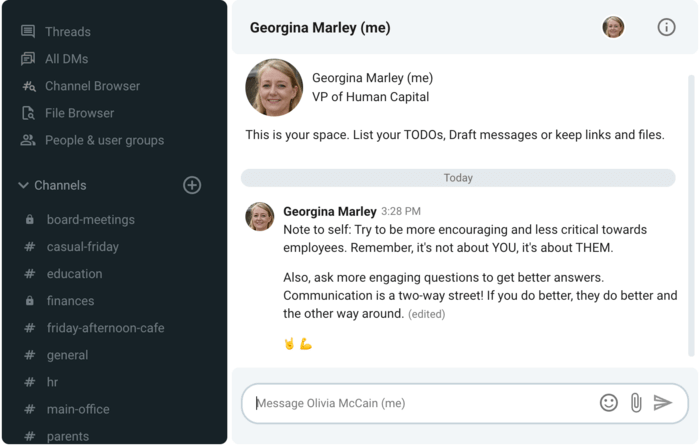
💡If you’re interested to know more about constructive feedback when working remotely, you can find all the information here.
2️⃣ Encourage open communication and listen to your colleagues
Another tip we can give you is simple: listen.
However, there’s a difference between passive hearing and active listening.
You have to make an effort. Don’t interrupt your colleagues. Concentrate on what they’re saying and don’t think about anything else. Make sure they don’t refrain from speaking their mind in fear of being ridiculed or overly criticized.
In our quest to find the best tips for achieving respectful communication, we reached out to Irene McConnell, an executive coach and an Official Member of the Forbes Coaches Council. She shared with us her opinion on the matter:
“One of the best tips for achieving respectful communication in the workplace is to foster a culture of listening. You should be listening to people when they talk to you instead of just nodding along and saying, ‘Of course!’
When you actively listen to people, you understand their views and are better able to replay and react. The other party also feels that their views and opinions are being heard, and a positive culture is created.”
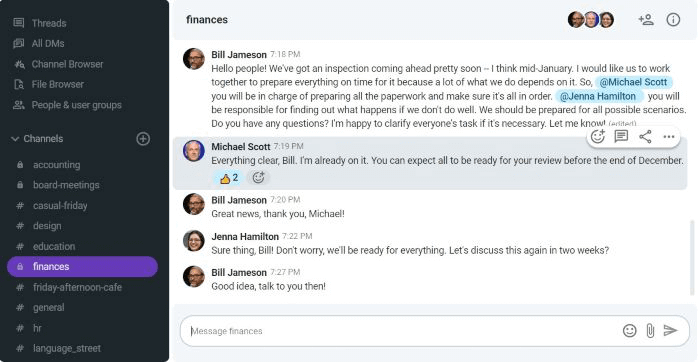
3️⃣ Speak with your colleagues, not about them
The next tip on our list is a juicy one. Just wait till you hear it!
Just kidding! The thing is, you should avoid these kinds of introductions into conversations with your colleagues — because they usually lead to gossiping and hearsay, which is to be avoided.
Refraining from gossiping is easier than you think. The rule of thumb is “speak with your colleagues, not about them”.
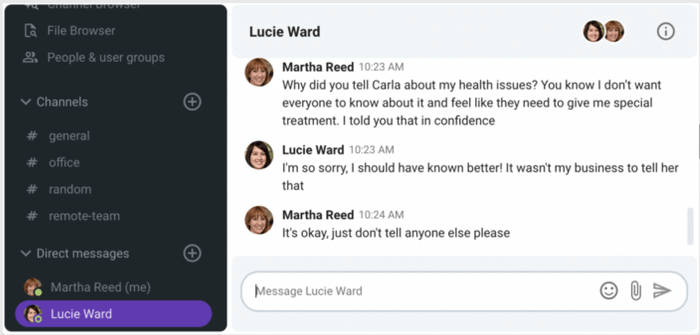
4️⃣ Practice kindness and politeness
Mark Twain once said: “Kindness is the language which the deaf can hear and the blind can see.” Being kind is not hard, but goes a long way.
Even when disagreeing with your coworkers, do your best to be polite. Frame your communication in a positive way. There’s no need for offending your colleagues since that could only worsen the problem.
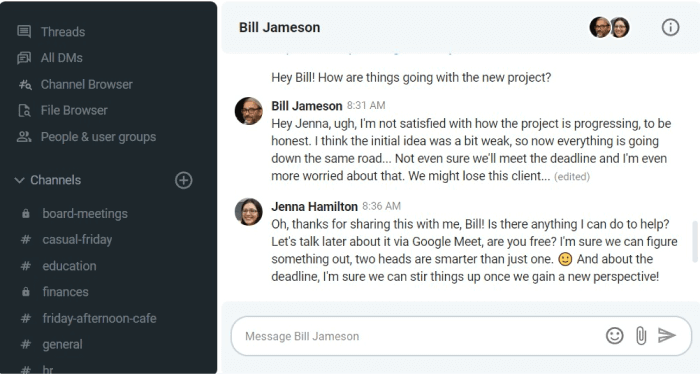
💡You can find more about chat etiquette in the workplace here.
5️⃣ Earn respect from others
Pop culture warns us “you only get what you give” — and we couldn’t agree more. If you want a harmonious respectful work environment, you need to earn respect from your colleagues — and what better way than to be respectful towards them?
I know this makes your head spin, and you feel like we’re going in circles, but trust us. Respect is a good investment that pays great dividends.
It’s not so hard. For instance, you should value the time of your colleagues. You cannot expect respect from your colleagues if you’re behaving like a jerk. Unfortunately, the days of toxic bosses aren’t numbered — but you can be an exception.
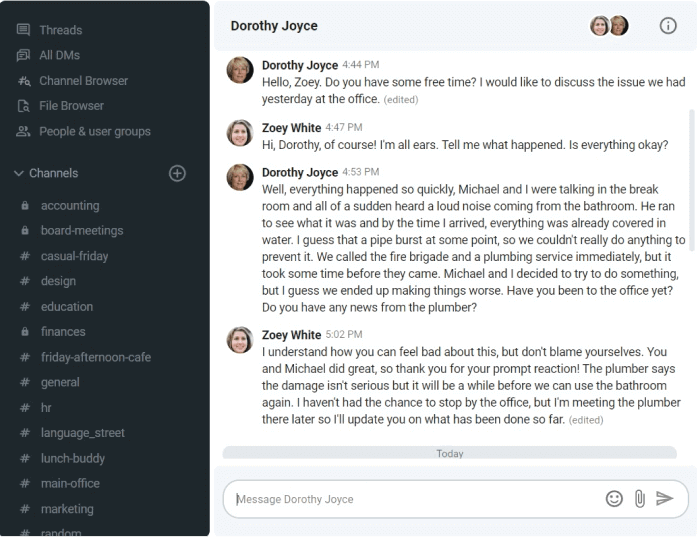
6️⃣ Consider dissenting opinions
“It’s my way or the highway” is no longer a valid nor desirable saying in the workplace (if it ever were). To achieve a harmonious work environment where everyone feels respected and appreciated, you should consider everyone’s opinion — no matter how much it differs from yours.
Don’t overcriticize, because it won’t get you anywhere. You’ll just create a toxic atmosphere in which no one feels comfortable.
Valuing different opinions is a powerful tool for creating a healthy dialogue among the team members. In that way, you’ll show your coworkers that all opinions equally matter and that you are open to discussion.
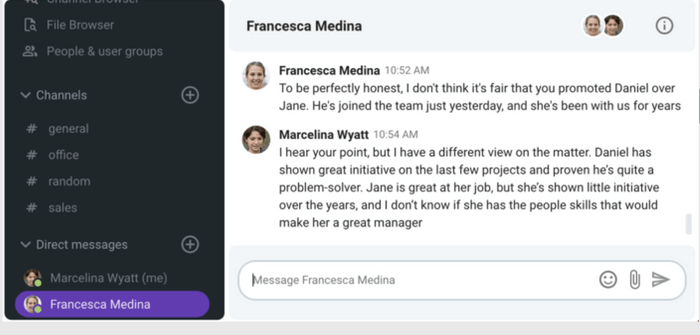
7️⃣ Treat everyone fairly and equally
Last but not least, you should treat all your colleagues fairly and equally. Remember that respectful communication in the workplace isn’t just about people’s skills and accomplishments. You need to take into account their personalities and be open towards everyone, without bias or prejudices.
Include all your colleagues in celebrations, workshops, and training and ensure that no one feels left out.
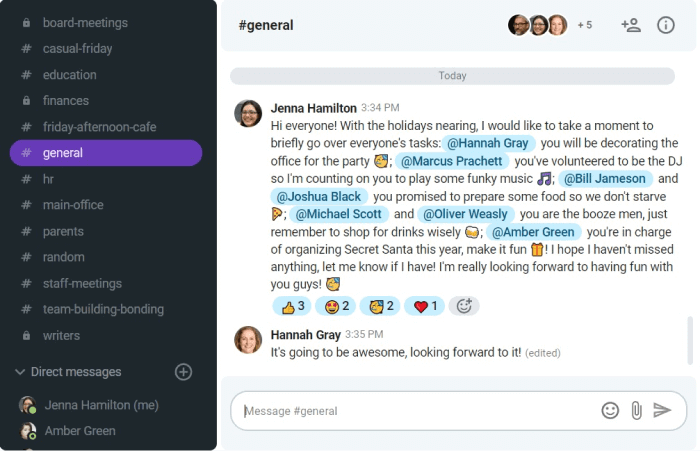
Conclusion: Respect is like air, don’t forget to breathe
Respect is a bare necessity in life, as well as in the workplace. The benefits of respect in the workplace are more than visible. On the other hand, its absence is greatly felt, as well as costly — and sometimes it’s not easy to recognize the problem. However, the fix is easy.
We offered you seven tips that should help you achieve respectful communication in the workplace. It’s as simple as spelling R-E-S-P-E-C-T and the very execution of the advice is not much more complicated than that.
We’ll leave you with the wise words of Maya Angelou: “I’ve learned that people will forget what you said, people will forget what you did, but people will never forget how you made them feel.”




